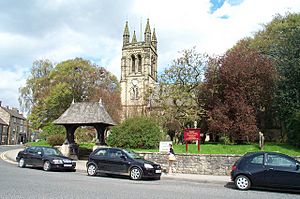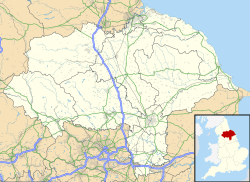Church of All Saints, Helmsley facts for kids
Quick facts for kids Church of All Saints, Helmsley |
|
|---|---|

The church, viewed from the south
|
|
| 54°14′49″N 1°03′45″W / 54.2469°N 1.0625°W | |
| OS grid reference | SE 620 789 |
| Location | Helmsley, North Yorkshire |
| Country | England |
| Denomination | Church of England |
| Churchmanship | Central |
| History | |
| Status | Parish church |
| Founded | 12th century |
| Dedication | All Saints |
| Architecture | |
| Functional status | Active |
| Heritage designation | Grade II* |
| Designated | 4 January 1955 |
| Architectural type | Church |
| Administration | |
| Parish | Helmsley |
| Deanery | Northern Ryedale |
| Archdeaconry | Cleveland |
| Diocese | Diocese of York |
| Province | Province of York |
The Church of All Saints is an old and important church in the town of Helmsley in North Yorkshire, England. It's a parish church, which means it serves the local community. You can find it near the market square and Helmsley Castle. This church is dedicated to All Saints and has been part of the Church of England since the Reformation. It's also a special building, recognized with a Grade II* listed building status, meaning it's historically important.
Contents
History of the Church
There has been a church in Helmsley for a very long time. It was here even before the Normans arrived in England. In fact, the churchyard was used as a market in Anglo-Saxon times. A very old gravestone, called a hogback, can still be seen in the church porch. This type of stone looks like a small house or a hog's back.
The church was mentioned in the Domesday Book in 1086. This was a famous survey ordered by William the Conqueror.
Organs and Rebuilding
In the mid-1800s, the church got a new organ. It was installed in 1852–53 by Mr. Whitehead of York. The first service with this new organ was held on January 27, 1853. The choir from York Minster even came to sing.
Between 1866 and 1869, the church went through a big rebuilding project. The Earl of Feversham paid for this work. Architects Banks and Barry designed the changes. Many parts of the old church were changed or removed. For example, the original medieval font was replaced. That old font is now in a church in Pockley. However, the church gained beautiful stained glass windows from Hardman & Co. of Birmingham.
In 1931, a new pipe organ was installed. This organ was made by Harrison & Harrison. It replaced an older organ from 1868. The new organ used some pipes from the old one. This Harrison & Harrison organ is still used for worship today.
Church Architecture and Design
The Church of All Saints was first built in the 12th century. It was made in the Norman style. You can still see two rounded Norman arches inside. One is over the main entrance, and the other is over the chancel. Norman arches are rounded, unlike the pointed arches used in later styles.
Building Features
The church has a tall tower with three sections at its west end. It also has a main area called a nave with four sections. There is a chancel with two sections, and transepts, which are like arms extending from the main body. The church also has a vestry and a south porch.
The church was repaired and updated in the 19th century. This work was done in the Gothic Revival style. However, it still includes parts from the original old church. The building is made of sandstone blocks, called ashlar, and has a steeply sloped stone roof.
The tower has narrow, tall windows called lancet windows. Some of these are from the 13th century. The tower also has round-headed windows for the belfry and octagonal turrets. These date from the 19th-century restoration. The south porch has a round arch that leads to a 12th-century doorway. The windows in the north aisle and at the west end were added in the 19th century. They have decorative stone patterns called tracery. The chancel also has round-headed and lancet windows.
Old photographs show that the roof was changed during the 1866–69 restoration. The church also used to have a low wall with square shapes, called a parapet with battlements, on its southern side.
Chapels and Art
The north chapel is dedicated to Aelred. He was an important leader, the third abbot, of the Cistercian monastery at Rievaulx Abbey. This chapel has a statue of the Virgin Mary and places for votive candles.
The south chapel is dedicated to Columba. He was a missionary from Ireland who helped bring Christianity to northern England. This chapel has wall paintings that show events from history. These paintings include pictures of Saint Oswald and a knight fighting a dragon. The dragon has symbols of pagan gods on it.
The church was given Grade II* listed building status on January 4, 1955. This means it is a very important historical building.
Modern Use of the Church
Today, the Church of All Saints is an active church. It has a regular group of people who attend services. Around 70 people usually come to worship here.
See also
- Grade II* listed churches in North Yorkshire (district)
- Listed buildings in Helmsley
Gallery
 | William M. Jackson |
 | Juan E. Gilbert |
 | Neil deGrasse Tyson |






